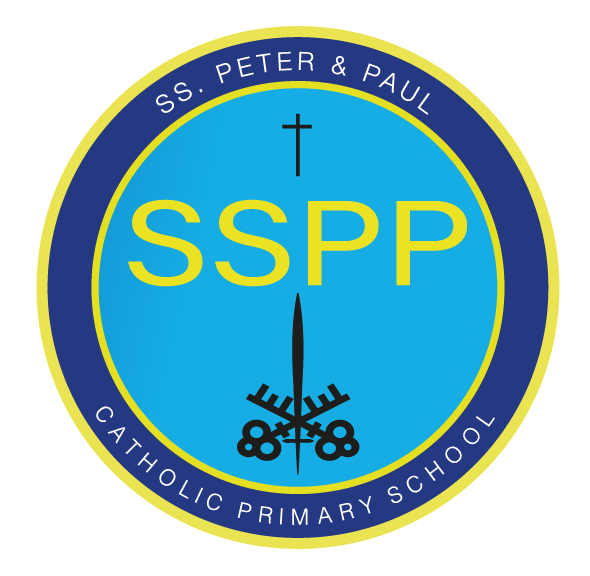
English
At SSPP, our English curriculum is designed to develop our pupils’ love of reading, writing and discussion. When our children leave Ss. Peter and Pauls, we expect them to be avid readers who are able to express preferences and opinions about the texts they read. We want them to read for pleasure, having had access to a wide range of text types, genres and authors in order for them to make informed opinions about their favourites. We recognise the importance of nurturing a culture where children take pride in their writing, can write clearly and accurately and can adapt their language and style for a range of contexts. Our pupils leave SSPP able to write with confidence and grammatical accuracy whilst developing their own individual flair.
Phonics:
At Ss. Peter and Pauls’, we are passionate about enabling all of our children to become confident and enthusiastic readers and writers. We believe that phonics provides the foundations of learning, which makes the development into fluent readers and writers easier for our pupils. Through phonics our pupils learn to segment words which supports their spelling ability and blend words enabling them to read words. We teach phonics through:
Discrete daily phonics sessions in EYFS and KS1 following the Little Wandle programme.
Regular guided reading sessions, phonics-based games, stories and activities.
Shared reading of a variety of books and visual texts.
Writing lessons which help the children to apply their phonics skills.
Reading:
We believe that reading is the key to all learning and so provide our children with a wide range of engaging, inspirational and diverse reading opportunities. We do this to foster a love of reading in our children whilst helping them to develop a secure understanding of the texts that they read. Our curriculum has been designed to ensure that our pupils not only read for pleasure and develop their comprehension skills, but also use books to research and gather new knowledge to extend their understanding. At Ss Peter and Paul's we teach reading through:
Daily systematic synthetic phonics sessions in EYFS and KS1 following the Little Wandle programme. Phonics interventions take place in KS2 where appropriate and needed.
Books are an exact match to pupils individual phonics levels. Children read these books both in school with a teacher and at home with their parents.
Pathways to Read is used throughout school to develop and nurture the children's reading ability and understanding of the texts they explore.
A range of genres meaning our pupils are exposed to and become knowledgeable about literary styles, authors and genres, enabling them to express opinions and give preferences using evidence to support their views.
Using high-quality text in all English lessons, including writing lessons and across other areas of the curriculum.
Appropriate adults listening to the lowest 20% of readers, in each class, read daily. We also encourage parents and governors to come in to hear children read.
Staff promoting a positive reading culture by sharing their love of reading with the children.
Reading events taking place throughout the year to encourage and promote enjoyment and opportunities to develop lifelong learning. These include: author visits, bedtime read, poetry readings, National Poetry Day activities, World Book Day activities, the Summer Reading Challenge and other school-based reading challenges.
The use of DEAR sessions (Drop Everything and Read) to give children a chance to enjoy what they are reading.
Children in Year 5 buddying up with pupils in F2 to share reading experiences weekly. The children look forward to this time in Year 5 where they can nurture the younger children's enjoyment of reading and share their own.
Every classroom having a bright and inviting reading area which has books to suit the needs of each class.
Developing our library using pupil voice and all staff taking ownership of its development.
Writing:
At Ss. Peter and Pauls, we consider the ability to write, fundamental to our children’s success as it enables them to access the next stage of their education and beyond. Our curriculum has been designed to develop confident, enthusiastic writers who are able to write clearly, accurately and coherently; write in different styles for different purposes and audiences; develop a wide vocabulary; and have a solid understanding of the grammar rules and terminology appropriate for their age group. We teach writing through:
Using high-quality texts that expose our children to high level vocabulary, a range of punctuation and grammar techniques and a variety of writing styles.
Embedding the use of ‘Pathways to Write’ throughout the school as a basis for the teaching of writing and as a means to improve writing standards.
Teachers modelling writing skills through guided writing, shared writing and whole class writing opportunities.
Documenting the four stages of the writing process from start to finish through the use of working walls.
Exploring vocabulary in detail and encouraging pupils to use a wider range of vocabulary.
Providing our pupils with more opportunities to write independently with the aim of improving their stamina, ability and technicality.
Providing our pupils with opportunities to write at length independently – applying taught skills.
Pupils having access to dictionaries and thesauruses in all English lessons.
Displaying pupil writing to give pupils a purpose and an audience.
Giving immediate verbal feedback during lessons to facilitate effective editing. Independent editing skills are encouraged and pupils begin to learn these skills from Year 1.
Handwriting:
From EYFS our pupils are taught to sit properly in order to have the correct posture for writing, including holding a pencil in the correct position. They begin by mark making, writing recognisable letters and writing simple phrases and sentences. They are taught the correct letter formation from the beginning of their school journey and are provided with regular opportunities to practice these. At Ss. Peter and Pauls, handwriting lessons take place regularly where we adopt a cursive handwriting approach from KS1. Our staff are expected to model the schools handwriting style at all times including when marking pupil work, writing on the board, adding to working walls and putting up any other displays.
Spelling:
In EYFS and Year 1, spelling is taught through daily 30-minute phonics sessions following the Little Wandle programme. From Year 2 upwards, spelling is taught following the ‘Pathways to Spell’ scheme, which incorporates and builds upon the foundations of pupil’s phonological knowledge. Throughout these lessons spelling patterns, rules and the origins of words are explored with the aim of creating confident and proficient spellers. Our children are taught to:
Spell accurately and identify reasons for mis-spelling
Proof-read and correct their spellings
Use dictionaries and thesauruses
Grammar and Punctuation:
Grammar and punctuation techniques are taught both discretely and as part of our English sequences of work to fit the writing genre we are exploring at the time. These lessons align with the appropriate year group expectations as set out by the National Curriculum. Our pupils are provided with many opportunities to identify examples of grammar and punctuation types in WAGOLLs (what a good one looks like) and in the books that they read. They are expected to incorporate these techniques into their writing where possible and appropriate, including in cross-curricular contexts.
Impact
Enjoy and have confidence in their phonics learning. They will transfer these skills to support their reading.
Read fluently for pleasure and to further their learning.
Choose to read from a wide range of book genres and make challenging choices.
Have a secure knowledge of spelling patterns and rules that they have been taught and they can apply this successfully when writing.
Confidently discuss their work and communicate well with each other to further understanding and learning.
Write with confidence and grammatical accuracy across the genres whilst adapting their writing to suit the relevant genre and audience.
Make adventurous and wide-ranging vocabulary choices when writing and speaking.
Consolidate skills, progress and deepen their understanding of how and when to use specific grammar and punctuation.
Improve their cross-curricular writing standards by transferring skills taught in English lessons to other subjects.
We hope that as children move on from Ss. Peter and Paul to further their education and learning, that their creativity, passion for English and high aspirations travel with them and continue to grow and develop as they do.
The impact of our English Curriculum will be measured by:
The progress pupils make in their work.
Year 1 phonic screening.
Year 2 and Year 6 statutory tests.
FFT aspire reading assessments which align with Little Wandle. These assessments identify pupils strengths and weaknesses in relation to: decoding, prosody, accuracy, fluency and comprehension.
Use of Reading and SPAG assessments termly in KS1 and half termly in KS2. Past statutory assessments are undertaken in Year 2 and Year 6 at key points in the year.
The accuracy and technicality of incidental writes and main writes.
Assessing pupils writing against statutory curriculum expectations.
All of the above inform our Balance assessment which is completed half termly.
EYFS
Throughout Early Years, children experience English reading through high quality texts, such as The rainbow fish by Marcus Pfister, The Jolly postman by Janet and Allan Ahlberg, and Lighthouse Keeper’s lunch by David Armitage and Ronda Armitage .
It is crucial for children to develop a life-long love of reading. Reading consists of two dimensions: language comprehension and word reading. Language comprehension (necessary for both reading and writing) starts from birth. It only develops when adults talk with children about the world around them and the books (stories and non-fiction) they read with them, and enjoy rhymes, poems and songs together. Skilled word reading, taught later, involves both the speedy working out of the pronunciation of unfamiliar printed words (decoding) and the speedy recognition of familiar printed words. Writing involves transcription (spelling and handwriting) and composition (articulating ideas and structuring them in speech, before writing)
Using vehicle Texts used as stimulus across the year, children will write initial sounds and simple captions and progress throughout the year to spelling words by identifying the sounds and then writing the sound with letter/s, using taught GPCs

